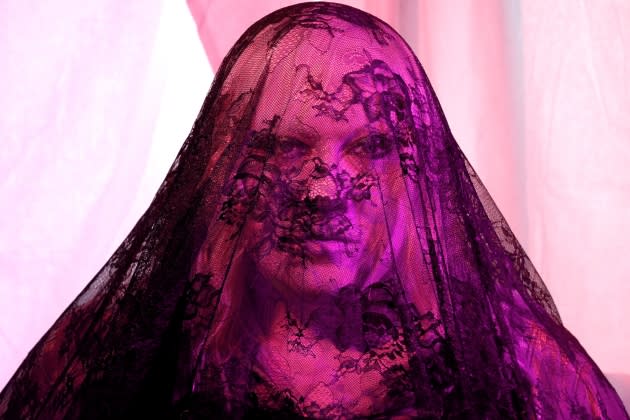Anohni Weeps Tragically and Beautifully on ‘My Back Was a Bridge for You to Cross’
- Oops!Something went wrong.Please try again later.
- Oops!Something went wrong.Please try again later.

Every track on My Back Was a Bridge for You to Cross feels like a Greek statue frozen in some tragic visage of horror. Anohni’s voice sounds delicate, angry, and exhausted, as she grieves track by track — for the unfulfilled promises of civil rights, for friends lost to drugs and depression, for the immolation of a world succumbing to ecocide. On one song, “Why Am I Alive Now?” her voice quivers and keens as she regards the discord closing in on her (leaves fall off trees, smoke chokes the air, her tears flow to the sea, and “all our memories are sinking into un-living”) and her despair sounds both beautiful and moving. You feel the burden she’s carrying as it crushes her back, and quite often it is beautiful.
But Anohni and her band, the Johnsons — named in honor of gay-rights activist Marsha P. Johnson, who graces My Back’s cover — has carried the weight of her worries for decades. That same tremulous voice and her holistic fragility were the defining aspects of her breakthrough album, 2005’s I Am a Bird Now, and they’re also the qualities that made her live performances in the early 2000s of the Velvet Underground’s “Candy Says” with Lou Reed so emotional, as she captured the aching body dysmorphia of trans icon Candy Darling. Some of her music over the years has sounded more upbeat and dance-forward (she’s collaborated with Hercules and Love Affair) but she’s always sounded best pulling at your heartstrings and dragging you into her world. It’s just in the way her voice flutters.
More from Rolling Stone
See 'Euphoria' Star Hunter Schafer's Video for Anohni and the Johnsons' 'Why Am I Alive Now'
Anohni Reteams With Hercules & Love Affair for New Song 'Poisonous Storytelling'
Bryce Dessner, Anohni Collaborate on New Version of 'Another World'
Anohni’s distress on My Back Was a Bridge for You to Cross widens slowly and changes hues like a bruise. One of her inspirations for the record was Marvin Gaye’s great protest, What’s Going On? — an album that gave cries for civil rights and acknowledging climate change equal footing — and while My Back lacks Gaye’s polish (the musical arrangements are raw and obtuse) it cuts nearly as deeply. Where Anohni’s best music in the past paired her voice with a piano and small arrangements, fuzzy guitars that recall classic rock and soul buttress her, making her voice work a little harder to transmit her messages.
The music of opener “It Must Change,” like many of the songs on the album, recalls the hot buttered soul of late-Sixties Isaac Hayes more than Gaye’s hippie-Motown fusion. But it diverges when Anohni opens her mouth with a list of everything that must change: “the way you talk to me, the things you do to me, the way you leave me.” Whether these are personal grievances or protests directed at the world at large, Anohni’s voice aches: “That’s why this is so sad,” she sings.
That blunt, unadorned expression of her emotions are her greatest tools on the album. On “Can’t,” a jazzy, slow rocker, she sings to friends who’ve passed, pouring everything into words like “I don’t want you to be dead,” then declaring, “I won’t have it,” as a Rob Moose string arrangement plays in the background. Her anger swells on the short “Go Ahead” (“You are an addict, go ahead, hate yourself,” she inveighs over hard-rock guitar) and on “Scapegoat” when she sweetly sings, “I can use you like a toilet.” On “Rest,” which bears an especially Hayes-y feel, she prays for her fellow protesters, “Rest like your hunger is the victory,” all building to an emotional, psychedelic soul outro. And on the final track, she sings, “You be free for me” as she sings the album title, comparing her back to a bridge for others to cross.
The most affecting songs are the ones where she latches onto her melancholy and rides it. “Why Am I Alive Now?” with its thrummed guitar, piano improvisation, and bongos, is a perfect elegy for the melting Earth. “All the animals around, watching nature swoon and sigh,” she sings, “Watching all the water dry, watch the sky fall to the Earth/Birds and insects looking for, for a place to hide.” You just want to weep with her. It’s like a Walker Brother song in a higher key. And on “Sliver of Ice,” a song about how appreciating the simplicity of letting an ice cube dissolve on your tongue can also melt your heart. (Reed inspired the song by explaining this sensation to Anohni on his deathbed.) Her voice rises and falls, as the guitar swells like an ocean around her; the song has enough filigree and shadow to feel like a This Mortal Coil outtake.
The push and pull of passiveness and assertiveness on My Back Was a Bridge for You to Cross feels organic at every turn. Sometimes the music can be a little too loose, careening like an out-of-control car (especially on the discordant “Go Ahead”), but the slackness is worth the freedom of hearing Anohni’s voice fly like the bird she became years ago. Mostly, the album feels mesmeric. She could fly anywhere from here … she just might not have a place on Earth to land.
Best of Rolling Stone
